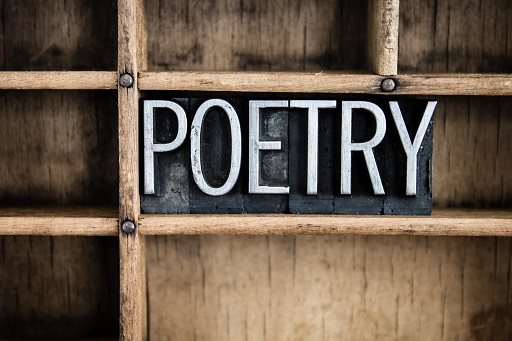3 What is poetry?
We can possibly best define what poetry is by saying what it isn’t. For one thing, poetry, unlike prose, cannot be paraphrased. If you could sum it up succinctly in any other fashion you wouldn’t write the poem. One can talk about the theme of a poem, for instance, but it’s the poem itself which conveys the ultimate effect. A poem is the best possible expression of what the poet wants to say. Some might say that the form and content of art, in this case poetry, is untranslatable.

Now look at a poem which directly addresses some of these issues, albeit in a humorous way.
Sports pages I: Proem
From ancient days until some time last week
Among the poet’s tasks was prophecy.
It was assumed the language ought to speak
The truth about a world we’ve yet to see;
Then in return for offering this unique
And eerie service, poets got their fee:
And yet, what any poem has to say’s
Bound up with all the vanished yesterdays.
Imagination lives on memory:
That’s true of love and war and thus of sport:
The world we love’s a world that used to be.
Its sprinting figures cannot now be caught
But break the flashlit tape perpetually,
Though all their life’s a yellowing report.
Forgive me, then, if speaking of what’s next,
I make the past a presence in my text.
For me it starts in 1956,
The Test against the Indians at Lords
As Roy runs in to bowl and Hutton flicks
A long hop to the crowded boundary-boards.
Or did he miss? Or hammer it for six?
But I don’t care what Wisden’s truth records.
When I dream back, the point is not the facts
But life enlarged by these imagined acts.
Forgive, then, the large licence I assume:
What I know’s not the truth but what I like.
The Matthews final found me in the womb
But still I went to Wembley on my bike.
When Zola Budd sent Decker to her doom
The gods had aimed their wishes down the pike.
This isn’t just a question of my bias:
All members of my tribe are bloody liars.
In the lines: ‘When I dream back, the point is not the facts/But life enlarged by these imagined acts’, the speaker is extricating poetry from the clutches of fact and history, even as he apologises for the licence that he takes. When he says that ‘Imagination lives on memory’, he means not that it exists within memory, but that it depends on it. The inadequacy of memory may be a virtue, in the poetic realm. Yet there’s a hard edge to his final rejoinder: ‘All members of my tribe are bloody liars’.
Sean O’Brien’s work is weighty and unrelenting, and politics permeate every corner of it. He is both a social and a literary writer and critic, sometimes associated with a group of poets from a northern working-class tradition: Tony Harrison, Douglas Dunn and, latterly, Don Paterson and Paul Farley.
Activity 3
Consider what has been said so far, the comments of Jackie Kay, Paul Muldoon and W.N. Herbert and your own views of what a poem might be. Write down your thoughts on the following remarks, by poets past and present, about what poetry is and how it works.
If I feel physically as if the top of my head were taken off, I know that is poetry.
… emotion recollected in tranquillity.
The blood jet is poetry. There is no stopping it.
… that willing suspension of disbelief for the moment, which constitutes poetic faith.
No surprise for the writer, no surprise for the reader.
Walter Pater and Oscar Wilde both said that all art aspires to the condition of music. They were both wrong. All bad literature aspires to the condition of literature. All good literature aspires to the condition of life.
Answer
Wordsworth and Plath seem to say opposite things. Do you agree or disagree with either of them? (Plath refers to the passion behind the poem; Wordsworth describes the detachment the writer has to experience, before they can see the whole picture, and when the internal editor or censor gets to work.)
Coleridge uses religious terms about faith and belief in describing poetry. Why do we need to suspend disbelief? How do we do that? (We willingly suspend disbelief when we watch a play or film, entering another world as if it were real – which it is, while we are there.)
What do you think Frost’s dictum might mean? (Writers don’t always recognise exactly what they are doing. Frost’s remark accounts for the vicissitudes of the creative process as well as warning us not to be imprisoned by the dictates of form.)
Activity 4
Now read Fleur Adcock’s Fleur Adcock’s [Tip: hold Ctrl and click a link to open it in a new tab. (Hide tip)] ‘The prize-winning poem’ which comments comically about poetry writing.
Answer
Adcock’s ironic and comical take on the act of writing a poem touches on many of the mistaken approaches to poetry discussed so far. For instance it talks of archaisms – using an old, supposedly poetic diction. In warning against such things the poem seems truly authentic and detailed, as if the poet has judged many, many poetry competitions in which the contributors have been so misguided. It also includes misconceptions that have not yet been covered in this course: for instance, the use of inversions. This is when the natural word order is changed, usually solely to achieve a rhyme. It is illustrated in the same line where inversions are mentioned – ‘will not their fate bemoan’. Here the verb is put at the end of the line just to get the rhyme. It might have read ‘will not bemoan their fate’. Such inversions are considered largely archaic now and are only usually used, as here, in a parodic or comic fashion.
